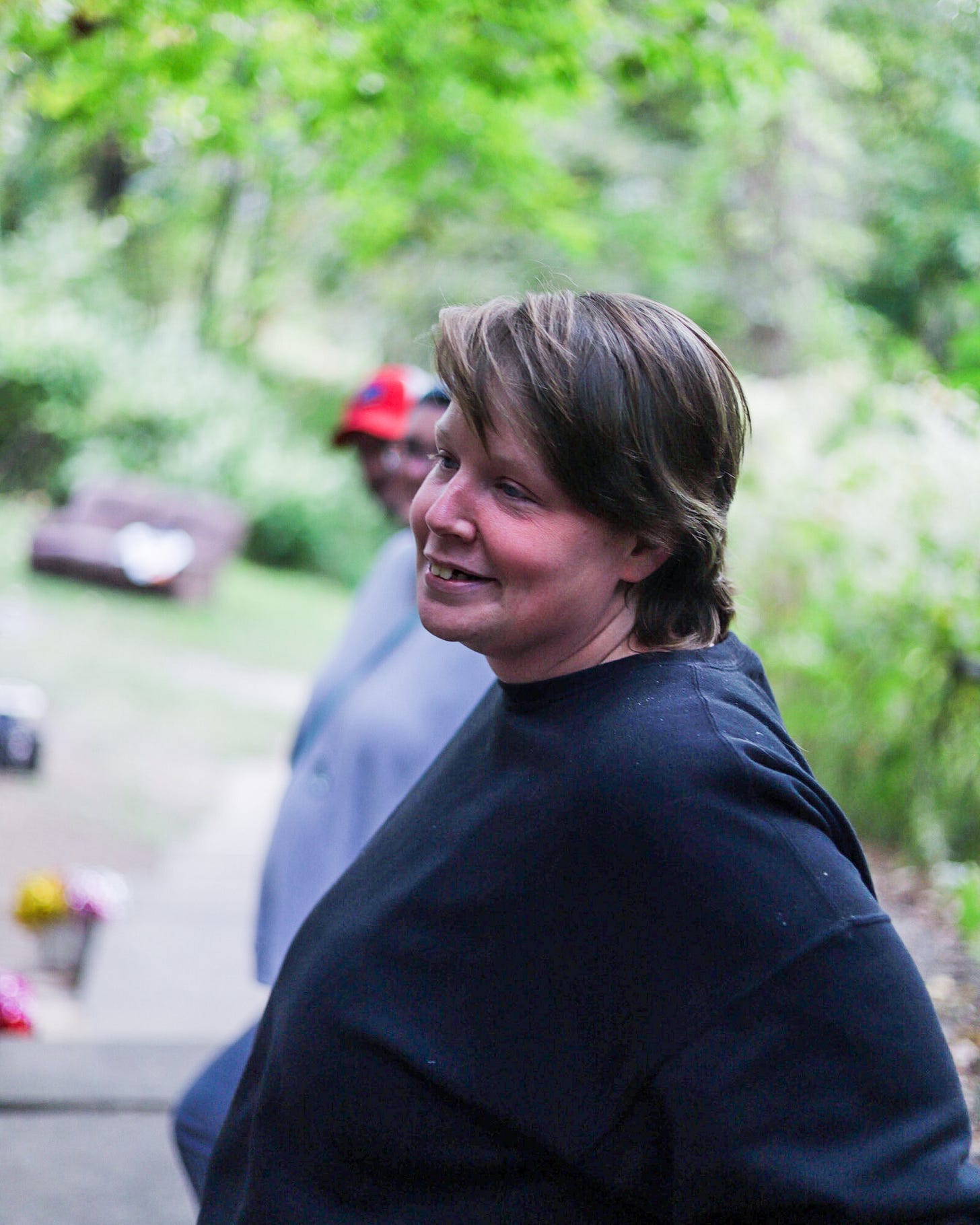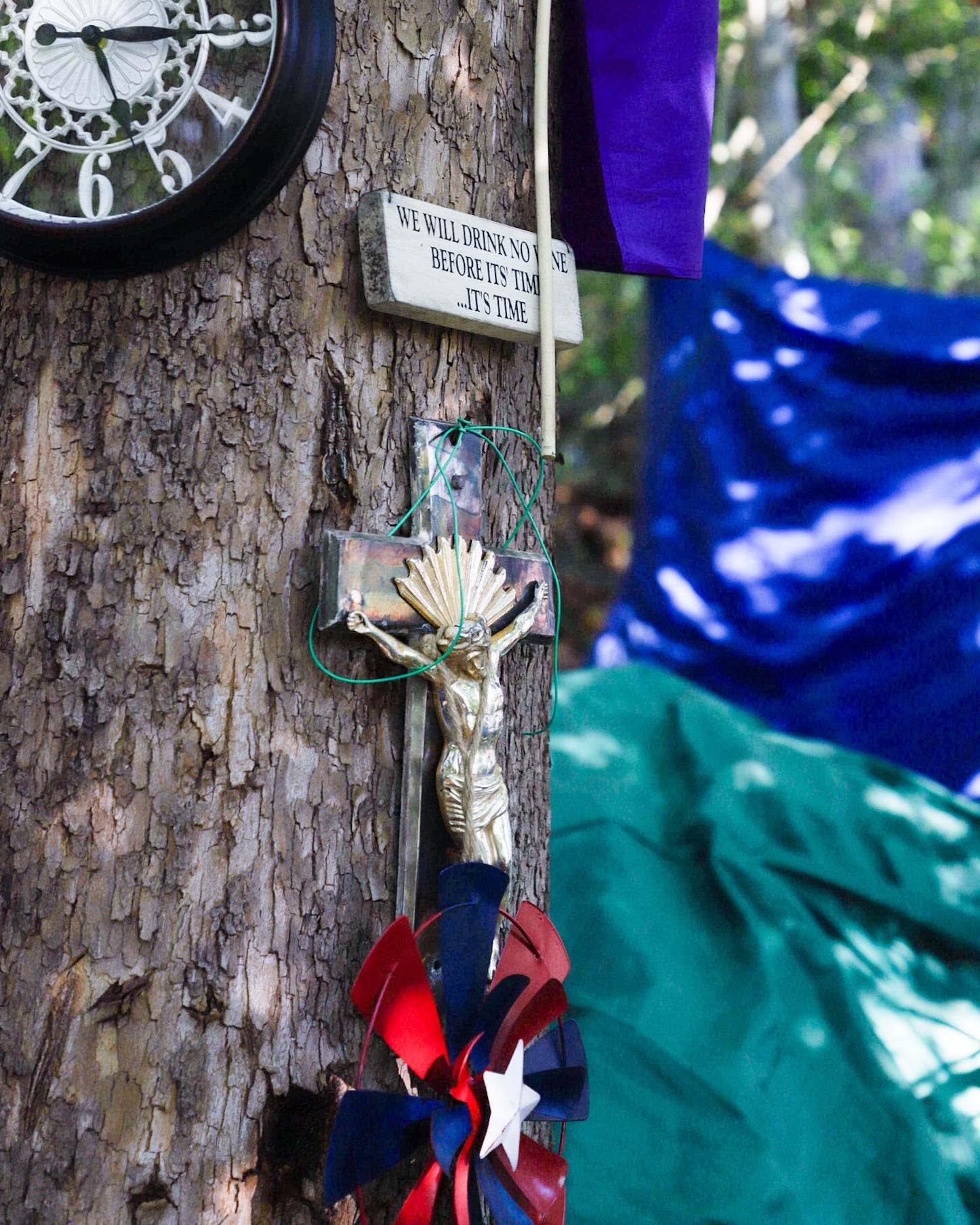"Where do they want us to go?" People Experiencing Homelessness React to Looming October 13 Eviction
As Wheeling prepares to evict some 30 individuals from a campsite the city previously told people to go, four people affected speak out against the eviction, potential ban on urban camping.
To listen to an audio version of this article, click here.
Dozens of residents at a campsite in East Wheeling have been grappling with an eviction notice since it was posted on September 29. Ordered by city manager Robert Herron, and delivered by homeless liaison Melissa Adams, alongside four Wheeling Police Department officers, the eviction is due to take effect on October 13, at 1:00 p.m.
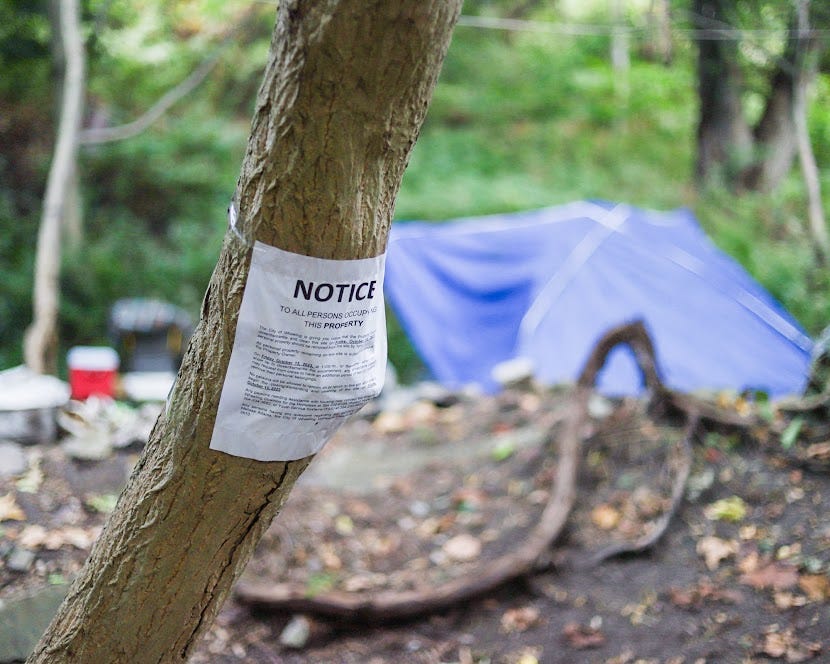
The eviction covers camps on a hillside in East Wheeling, sitting above the Nelson Jordan Center on Charles Street, and below Grandview Street. The site is home to an estimated thirty people who stay in tents and tarped-off areas.
Residents will have to relocate themselves and their belongings by 3:00 p.m., at which time it is anticipated that charges may be filed and/or belongings discarded.
No alternative location was given to individuals affected by the eviction.
In recent years, as city officials have closed smaller camps along creeks, trails, and under highways or bridges, those affected have been encouraged to relocate to the hillside camp in East Wheeling.

Over the summer, Melissa Adams updated service providers at her monthly homeless liaison meeting about recent West Virginia DEP clean-up efforts, and talked about turning the space into a managed camp. It seemed as though residents of the hillside would be safe from displacement.
That all changed when the eviction notice was served in late September.
Complicating the situation is an urban camping ban, passed by the city of Parkersburg and endorsed by the city manager of Wheeling, as well as Wheeling city councilors Jerry Sklavounakis, Ward 4, and Ben Seidler, Ward 2.
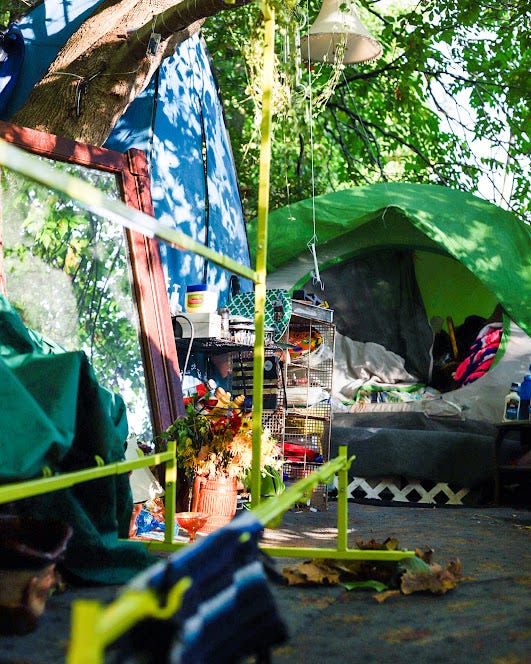
On September 26, the Parkersburg city council approved an ordinance banning urban camping in the city by a vote of 7-1. Individuals in violation of the ban, who are most-likely experiencing homelessness, substance-abuse disorders, mental health issues, or poverty in general, may be fined no less than $100, and no more than $500.
This comes as temperatures have plummeted in the Ohio Valley, with night time lows already dipping into the upper-30s..
On September 30, a local Wheeling paper, The Intelligencer, posted a story with quotes from city manager Herron where he said he anticipated a Parkersburg-style urban camping ban to be discussed at the Wheeling city council.
Ordinances similar to the Parkersburg urban camping ban have been adopted by cities across the West Coast, like Denver, CO, Boise, ID, and Phoenix, AZ. In the case of Denver’s ban, a judge struck it down as unconstitutional. As for Boise and Phoenix, judge’s in the respective cases, including the Supreme Court of the United States, have denied hearing the case.
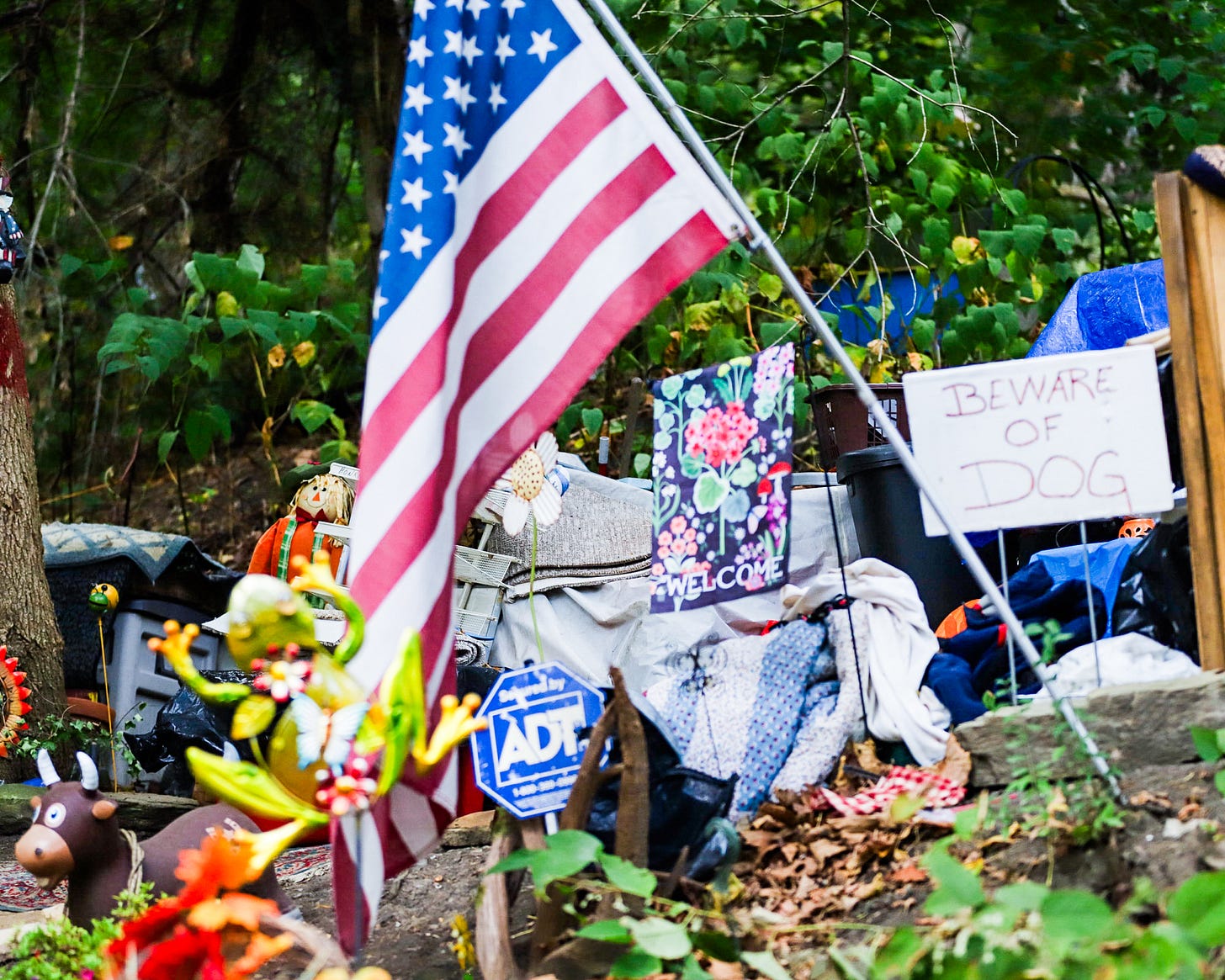
A new suit, joined by several major metro-areas in the West, has been sent to the SCOTUS, but justices have yet to decide whether they will hear the case.
The two issues–a looming October 13 eviction of the East Wheeling camp and a potential urban camping ban–sent concerned citizens, service providers, and advocates, to Wheeling’s October 3 city council meeting to object to both.
This was the first time the eviction was discussed in public, brought to the community’s attention by the public, not city officials. At the time of publication no city official, elected or appointed, has spoken in defense of the eviction.
Mayor Glenn Elliott told residents that the eviction was not a council decision, and no urban camping ban had been announced. Elliott did say discussions may take place regarding a camping ban.
A proposal may come as soon as October 17, when Wheeling’s city council next convenes. If this occurs, a vote for adoption of the ordinance may take place on November 7.
With the two issues coalescing, people experiencing homelessness are being thrown further into chaos as they unpack the immediate need to relocate amidst a possible ban on their ability to sleep, camp, or store belongings, on city property.
Kate Marshall, the Facilitator of the House of Hagar, an organization providing support to people experiencing homelessness, substance use disorders, mental health issues, and poverty issues, spoke with this reporter.

“I only know of two types of property: public property and private property,” Kate Marshall told this reporter. “If a ban on public property goes into effect, a person is put into a position where they cannot follow the law no matter what they do.”
“How do we make a law in which that law cannot be followed,” Marshall said. “If we are doing that, we are criminalizing poverty and we’re criminalizing homelessness.”
Marshall continued, saying that individuals may have to seek shelter on private property, including abandoned buildings, which could see potential felony charges levied against those found in violation of a potential ban.
Many of the people experiencing homelessness in Wheeling attempt to access shelter beds. Four organizations exist in the city who provide year-round shelters. Combined, they have capacity for less than 100 people.
In March, former chair of the Human Rights Commission of Wheeling Ralph Dunkin said at their monthly meeting that a local organization working with the homeless population could name 250 individuals they serve by name.
Even if the current shelters operating in Wheeling had enough beds for every person experiencing homelessness, none are low-barrier meaning they do not guarantee beds to all people, regardless of available IDs, criminal background, substance-abuse disorder, or experiencing a mental health crisis.
The Winter Freeze shelter, which operates from December 15 to March 15, is a low-barrier shelter with bed capacity below 100.
The Life Hub, a non-profit seeking to build a year-round low-barrier shelter, has yet to break ground at their location on Chapline Street. Despite that, the Life Hub operated the Winter Freeze shelter in 2022-23 at the Catholic Charities building, and is expected to operate it in 2023-24 at the First English Lutheran Church.
Residents of the East Wheeling hillside facing eviction and a potential urban camping ban were confused, hurt, and frustrated. The prospect of losing their belongings has people at the site scrambling to find new shelter with no guidance from the city evicting them.

Natasha, a daughter of Bellaire, and Wheeling resident for years, spoke to this reporter about the situation the city has put her in. “Where do we go from here,” she said, in reaction to the eviction. “Every time [the city] evicted us they gave us a place to go, and now they are saying they don’t have nowhere.”
“I have been evicted from five different spots now in the last nine months,” Natasha said. “You tell us we can be there (the East Wheeling hillside) and then you come and tell us we can’t be there…it’s just crazy to me.”
Natasha became emotional, as anyone facing the loss of their home would be. “You lose so much when you have to keep moving,” she said. “How would they feel if they up and lost everything and were forced into a tent, and then be taken from that.”
She began to sob quietly as Kate Marshall comforted her.
“If they just put themselves in our shoes it could be them,” Natasha said. “No matter how hard we try, it's still not good enough.”
Aubrey is also a Wheeling resident who camps in the downtown area of the city. As she discussed the potential urban camping ban with this reporter, Aubrey said people experiencing homelessness couldn’t pay the fines for violating an ordinance. Despite the fear of financial or criminal difficulties, she says she will camp until the Winter Freeze shelter opens.

“The only option we have is to find a way to make it work, no matter how hard it is,” Aubrey said.
“It’s taking an already bad situation and making it completely worse,” Aubrey said of the eviction and urban camping ban. “It’s sad that it’s coming to this. Basically our tents are all we have. Taking our tent from us and not allowing us to sleep outside is crazy.”
Aubrey, like many others, had a simple question for city leaders. “Where do you want us to go?”
Aubrey also proposed an idea for the city to turn abandoned buildings into shelters. While the city lacks enough beds for the homeless population, it has plenty of structures sitting disused. The city has spent millions to purchase some vacant properties in the area, like the former Ohio Valley Medical Center campus and the former Clay School.
Asked if she had a message for city leaders, Aubrey implored those in power to see her humanity. “We are people just like they are,” Aubrey said. “Just because they have somewhere to go that’s warm at night they need not forget that there’s some of us out here in the cold and the rain. We’re just trying to survive like everyone else.”
“Regardless of if they want us to be here or not, we have nowhere to go,” Aubrey said. “This is our home just like it’s their home.”
Misty stays on the East Wheeling hillside facing eviction on October 13. Before experiencing homelessness, she lived in her parents' car. She stays in East Wheeling to be close to her dad and to help with his daily tasks as he suffers from mobility issues.
“They’re trying to get rid of the tents and sleeping places and that’s not a solution,” Misty said. It’s going to commit more crime, or more breaking and enterings to places because there’s nowhere to go.”
She says city leaders need to redirect people to a safe place in order to solve the homelessness problem, not evict them from their camp. “You need to solve the problem of us not having anywhere to go,” Misty said.
Misty had a dire prediction of what will happen if a ban on urban camping is passed in the city of Wheeling.
“They’re going to have a lot of frozen dead people in the street, or in abandoned houses,” she told this reporter, somberly. “I’m not playing. There’s a lot of [people experiencing homelessness] who are older who can’t handle [the cold].”
Asked if she had a message for leaders, Misty echoed sentiments this reporter heard many times: you could be homeless, too.
“Wait until you guys get into a hard spot and you don’t have nowhere to turn to,” Misty said. “Then [city leaders] might think, ‘maybe I shouldn’t have done that to these people.’”
Doug and his partner became homeless six months ago. Before that, he worked in the oil & gas field making $100,000 per year, and his partner owned a home in Bethlehem.
After falling on hard times, and his partner’s home being foreclosed on, the couple moved to various camps before ending up at the East Wheeling hillside.
As far as Doug is concerned there are no problems on the area. He told this reporter that patrons of the Nelson Jordan Center, the only business directly next to the campsite, like them being there as they keep an eye out for break-ins.
Workers at the Nelson Jordan Center have opened their showers up to some on the hillside, and have offered Doug work to help him save money to get back into housing.
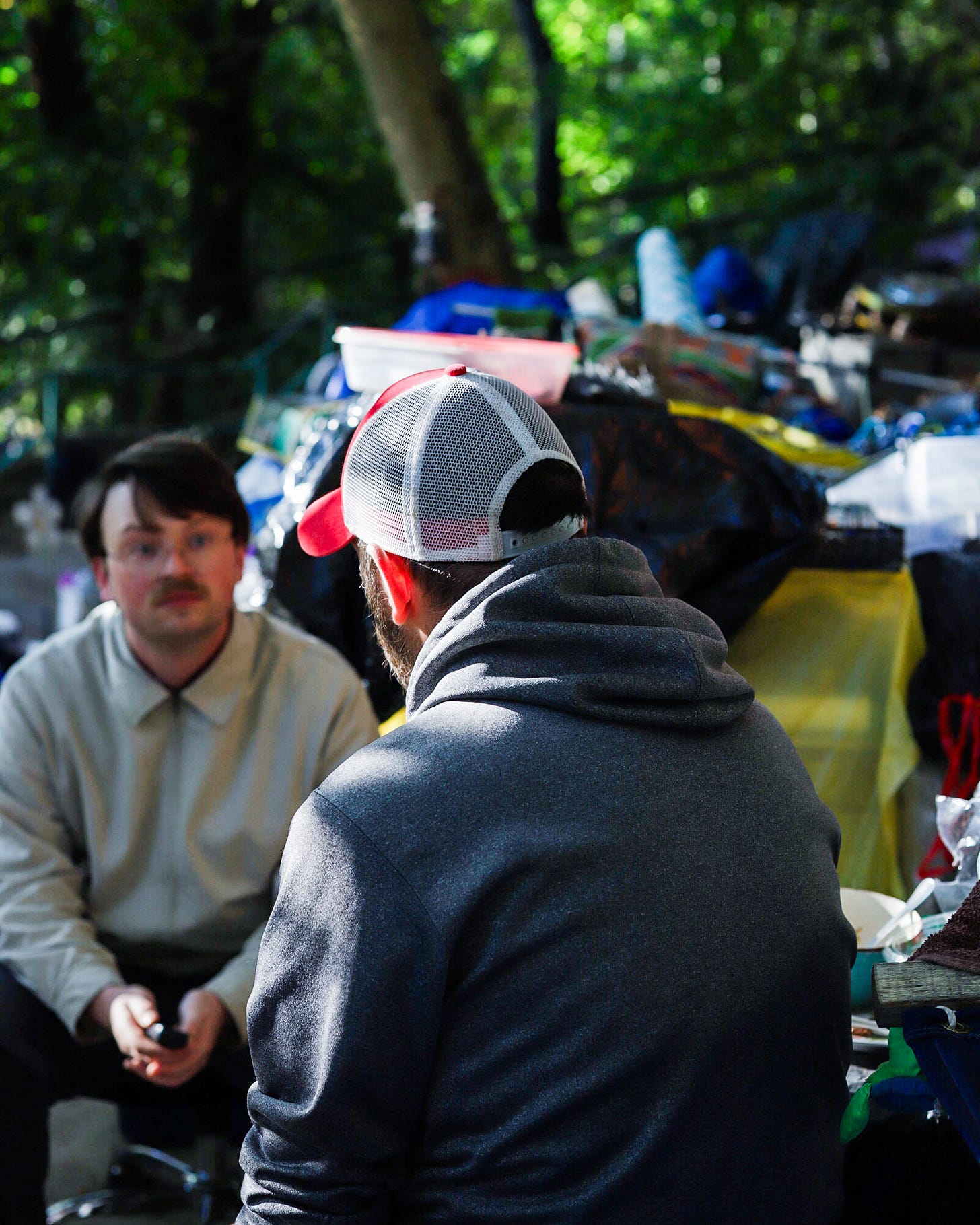
Doug recalled the moment he got the eviction notice. He said he was sweeping the sidewalk outside of his camp when the four officers and Melissa Adams came. The officers told Doug it wasn’t their choice to serve the eviction, but the city’s.
“The way it was explained to me was come Friday (October 13) at 1:00 p.m, whatever is left here stays here,” Doug told this reporter. “The only question I had was why, and they said because of the crime and stuff in town.”
“I just want to know why,” Doug repeated. “I want a better reason. Just saying there’s crime in the city, that don’t do it for me cause I’m not involved in none of it.”
In spite of the looming evictions, residents of the East Wheeling hillside still managed to laugh, pray, and create art.

On a trip to the camp, Misty showed off a wreath she had made out of the wild grape vines. Doug held up a picture that said “Hillbilly Proud” with an American flag and a depiction of a skull with a pickaxe. As this reporter exited the camp, a man played drums to the sound of a rap song.
Just days from losing everything, people dared to continue persevering.
At the time of publication, the eviction is still expected to take place on October 13. Activists, service providers, and concerned citizens are expected to rally in support of the residents of the East Wheeling hillside on Thursday, October 12, outside the city-county building.
The Hudson Editorial has reached out to the city manager, Robert Herron, for comment on the timeline for the eviction. As of publication, these requests have gone unanswered.
Those wishing to support our friends, family, and neighbors experiencing homelessness can donate blankets, clothes, hats, gloves, toiletries, hand warmers, and other essentials, to the House of Hagar at 114–14th Street.
Those wishing to speak out against a potential urban camping ban are encouraged to attend Wheeling’s city council meeting on Tuesday, October 17. Plan to arrive by 5:00 to sign up.
To listen to an audio version of this article, click here.





